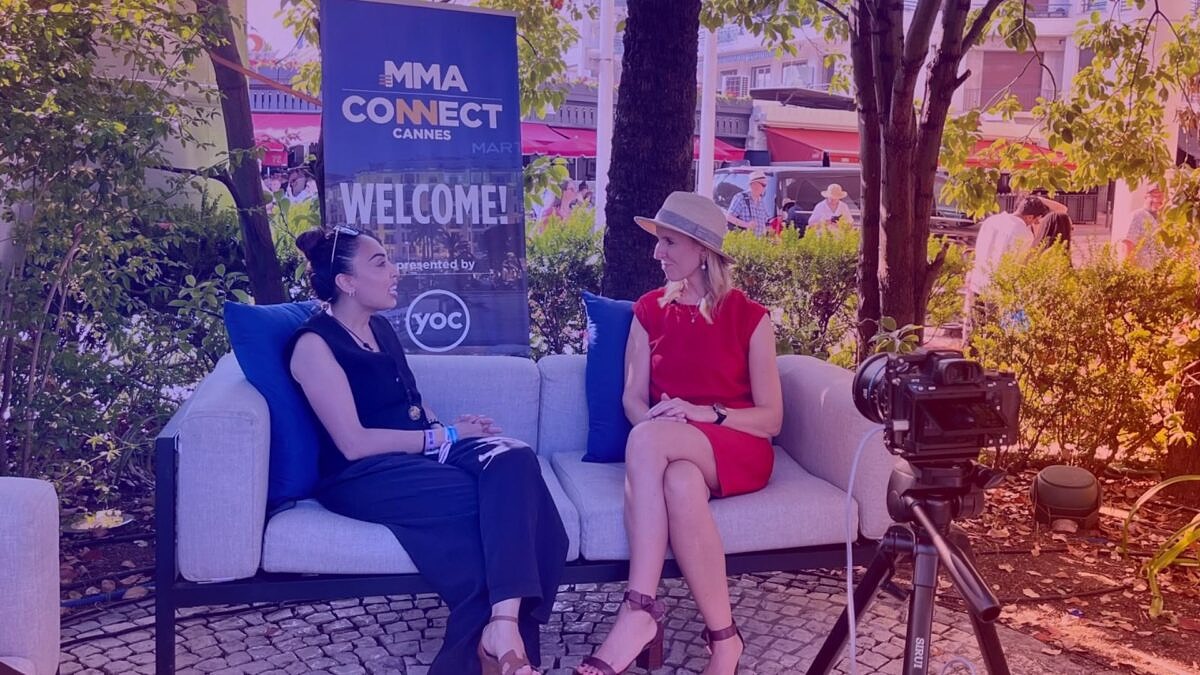8 Leading Voices on Current Trends in Marketing at Cannes 2025
Eight top figures from the sector chat with DMEXCO’s host Verena Gründel about creative effectiveness, AI in digital brand communication and the most important current trends in marketing, direct from Cannes.

8 top decision-makers, 8 current trends in the marketing industry
What does creative effectiveness look like today, and how is artificial intelligence changing the way brands communicate? DMEXCO’s host Verena Gründel spoke with eight leading decision-makers from the international advertising and media industry at MMA CONNECT in Cannes. The conversations focused on questions such as: Which current trends in marketing are impacting these sectors in 2025? What does creative effectiveness mean in a global context? And in what specific ways is AI being used to make content creation and media smarter, faster and more efficient? The discussions are a rich source of valuable insights, international perspectives and practical lessons.
#1 Elvin Altun, Regional Director, MMA DACH
Elvin Altun is Regional Director of the Mobile Marketing Association (MMA) DACH, the German-speaking arm of a global nonprofit association that brings together advertisers, agencies and technology providers. In our interview, she discusses key developments in global marketing. In addition to the omnipresent topic of artificial intelligence, Elvin Altun talks about the transformation within marketing organizations and new ways to implement personalized advertising in compliance with data protection regulations. She comments about a clear marketing trend she has observed: away from static, global campaigns and toward modular, locally adaptable content that can be tailored dynamically.
“When companies use personalization consistently in their advertising, it can even change their stock price. We call measures like these stock moving initiatives.”
MMA isn’t just an observer when it comes to AI, either – it’s an active driving force. As part of a global AI coalition, Elvin Altun has been monitoring more than 30 brand experiments that are revealing how cookieless personalization can improve campaign metrics by up to 300 percent, with the goal of not only increasing efficiency but also influencing company value in the long term.
#2 Katja Keulertz, International Brand Manager, and Lotti Tömörri, Senior Brand Activation Manager Europe, at Henkel
Katja Keulertz and Lotti Tömörri work in the Schwarzkopf LIVE team at Henkel, an internationally established brand in the beauty segment. In their interview, they talk to Verena Gründel about the latest industry trends, including “skinification” (ingredients and routines transferred from skin care to hair care), the increasing importance of scalp care and innovative products for textured hair. They define creative effectiveness as a combination of emotional appeal, consistency across all touchpoints and the early integration of creator expertise within production. They explain how the goal is to develop content that aligns with Gen Z and social platforms like TikTok in terms of tone, format and dynamics.
“To remain effective even when budgets might be smaller, it’s really important to communicate with brand cues and repeat them consistently to build iconic assets for the brand.”
The team also takes a practical approach to its use of artificial intelligence. In the early concept development phase, AI supports ideation and design validation. At European level, it’s used to help localize assets, implement voice-overs and adapt campaigns for different countries.
#3 Sinem Soydar, Head of Digital and Social Media, Shell
Sinem Soydar is responsible for Shell’s global digital and social media strategy. Speaking with Verena Gründel in Cannes, she shares her perspective on current trends in the marketing industry, especially the growing importance of contextual relevance and the smart use of insights in digital brand communication. For Soydar, creative effectiveness is a holistic process: from insight-based development and optimized content production to performance and conversion, whether your goal is to drive up sales or awareness. Her particular focus here is on data-driven personalization – a key marketing trend for global brands.
“Not a single day goes by now when we don’t talk about AI. It’s a matter of enabling personalization at scale. That means bringing together content, creativity and effectiveness.”
In addition to using artificial intelligence internally, Shell also works closely with partners such as agencies and SaaS providers to develop scalable, enterprise-wide solutions. The company’s objectives? More efficient production, better targeting and more effective media planning.
#4 Natasha Maharaj, Senior Director Global Brands, Heineken
Natasha Maharaj is responsible for international brands including Desperados, Tiger and Amstel within the Heineken Group. In her interview, she talks about a paradigm shift in marketing: away from traditional advertising and influencer campaigns and toward creator-led content. With her campaign for Desperados – which has recently taken home a stack of awards – she shows how collaborative approaches with 75 creators are opening up new avenues in music, culture and brand presentation. The message is clear: Creator marketing is here to stay.
“For me, creative effectiveness starts with courage, because if you only focus on performance, your work will no longer stand out.”
Natasha Maharaj sees artificial intelligence as a valuable addition to the marketing process, supporting efficiency, iteration and integration. Nevertheless, she believes that the human factor remains essential, especially when it comes to emotional appeal, genuine insights and creative ideas.
#5 Giuseppe Fiordispina, Marketing Director, CUPRA
Giuseppe Fiordispina is responsible for marketing at CUPRA and SEAT in Germany and believes the sector is going through a period of radical change. In his view, the role of advertising is shifting significantly: away from traditional product campaigns and toward cultural relevance and brand-driven storytelling. CUPRA is purposefully positioning itself as an experience brand that appeals to people on an emotional level and becomes part of their lives, with events, sponsorship and a clear focus on brand experience.
“People want to be addressed as individuals, not as part of a crowd. And that’s where AI can provide a very, very significant and efficient helping hand.”
While traditional advertising activities are easy to measure, experiences that are influenced by culture call for courage and require intelligent tools for monitoring: via social media, brand uplift analyses and target group interactions. Giuseppe Fiordispina’s team uses artificial intelligence both for asset production and, increasingly, for automation and personalization, for much more precise targeting and greater efficiency at every stage of the funnel.
#6 Birgit Wiggert, Senior Manager Media Verticalization, Allianz SE
Birgit Wiggert is responsible for the global media verticalization program at Allianz SE, which aims to make media activities more efficient, consistent and effective worldwide. She manages the core relationship with Allianz’s global media agency and acts as a link between the agency, central management and international markets. Allianz’s corporate social responsibility is a key aspect of her work. With initiatives such as “Power of Unity,” the company is positioning itself as a driver of cohesion, inclusion and diversity, including through media campaigns.
“We are currently figuring out how we can create campaign assets entirely with AI. In Germany, for example, we ran a pet insurance campaign that was developed completely by AI.”
For Birgit Wiggert, creative effectiveness begins in the campaign development phase: through testing, market adaptation and targeted measurement depending on the distribution structure. AI not only supports planning at Allianz, but also increasingly the creative development, adaptation and optimization of ongoing campaigns in close collaboration with partners such as Google.
#7 Bastian Döring, SVP & Global Sales, ShowHeroes
Bastian Döring has been with ShowHeroes for over eight years and, as SVP Global Sales, heads the company’s international sales activities in Germany, Spain and elsewhere. ShowHeroes specializes in contextual video and connects publishers, advertisers and users via high-quality video environments on the open web. It focuses on innovative video solutions that enable publishers to better compete with platforms like TikTok and YouTube and give advertisers access to additional, relevant reach.
"AI plays a huge role in every step of the process at ShowHeroes: from topic identification and context analysis to optimization of the creative and reporting."
He divides creative effectiveness into two phases. First, it’s about identifying the perfect moment and context in order to capture users’ maximum attention. This is followed by delivering the creative, for example through customized video players, as demonstrated in a recent campaign for a French car manufacturer. AI helps in every phase: editorial planning, semantic analysis, targeting and ongoing optimization via meaningful KPIs.
#8 Alma Lipa, Chief Digital & Marketing Officer, L’Oréal DACH
As CDMO, Alma Lipa is responsible for L’Oréal’s digital and marketing activities in Germany, Austria and Switzerland. In a dynamic market like the cosmetics industry, she’s constantly identifying new micro- and megatrends, with a specific focus on cultural relevance and local events. In Germany, for example, L’Oréal draws on occasions like Oktoberfest or Carnival to develop specific looks and communicate them through tailored content pieces.
“Why don't you work with AI? That would be a better question. It's become a hygiene factor.”
For Alma Lipa, artificial intelligence is no longer simply a trend, but rather an integral part of content production and workflow optimization. Visualizations, campaign assets and copywriting can all be implemented more efficiently and to a high quality. She explains how scalability is important, but one thing matters above all else: “You improve the quality of your output by using AI tools.”
A new approach to creativity: marketing trends in 2025 and beyond
Whether in beauty, finance, FMCG or the media, creative effectiveness isn’t achieved by chance – it’s the result of clear insights, local understanding and intelligent technology. When it comes to positioning a brand successfully, it’s important to think big, but also to stay in tune with the everyday lives of your target audience.
Artificial intelligence is playing a central role here by facilitating, accelerating and boosting quality. But in the midst of all this technology, one thing remains clear: The best ideas always start with human insight.
With examples ranging from creator-led content and modular campaigns to AI-generated assets, these eight voices from Cannes reveal how current trends in marketing are being put into practice.






